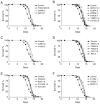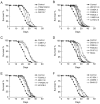Longevity determined by developmental arrest genes in Caenorhabditis elegans
- PMID: 17521386
- PMCID: PMC2746107
- DOI: 10.1111/j.1474-9726.2007.00305.x
Longevity determined by developmental arrest genes in Caenorhabditis elegans
Abstract
The antagonistic pleiotropy theory of aging proposes that aging takes place because natural selection favors genes that confer benefit early on life at the cost of deterioration later in life. This theory predicts that genes that impact development would play a key role in shaping adult lifespan. To better understand the link between development and adult lifespan, we examined the genes previously known to be essential for development. From a pool of 57 genes that cause developmental arrest after inhibition using RNA interference, we have identified 24 genes that extend lifespan in Caenorhabditis elegans when inactivated during adulthood. Many of these genes are involved in regulation of mRNA translation and mitochondrial functions. Genetic epistasis experiments indicate that the mechanisms of lifespan extension by inactivating the identified genes may be different from those of the insulin/insulin-like growth factor 1 (IGF-1) and dietary restriction pathways. Inhibition of many of these genes also results in increased stress resistance and decreased fecundity, suggesting that they may mediate the trade-offs between somatic maintenance and reproduction. We have isolated novel lifespan-extension genes, which may help understand the intrinsic link between organism development and adult lifespan.
Figures





References
-
- Alone PV, Dever TE. Direct binding of translation initiation factor eIF2gamma-G domain to its GTPase-activating and GDP-GTP exchange factors eIF5 and eIF2B epsilon. J Biol Chem. 2006;281:12636–12644. - PubMed
-
- Arantes-Oliveira N, Berman JR, Kenyon C. Healthy animals with extreme longevity. Science. 2003;302:611. - PubMed
-
- Berdichevsky A, Guarente L. A stress response pathway involving sirtuins, forkheads and 14-3-3 proteins. Cell Cycle. 2006;5:2588–2591. - PubMed
-
- Boehm M, Slack F. A developmental timing microRNA and its target regulate life span in C. elegans. Science. 2005;310:1954–1957. - PubMed
Publication types
MeSH terms
Substances
Grants and funding
LinkOut - more resources
Full Text Sources
Medical
Molecular Biology Databases
Miscellaneous

